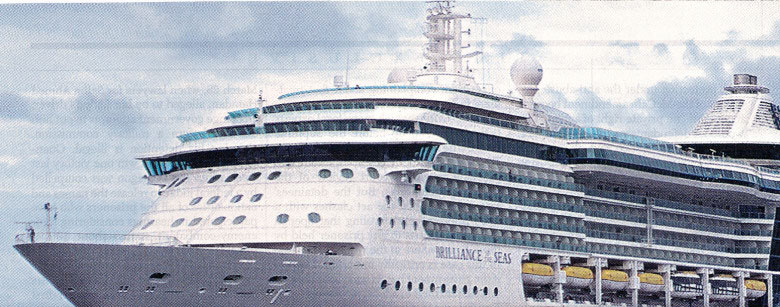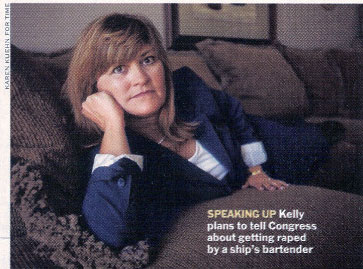By JULIE RAWE | TIME Magazine
Tuesday, Mar. 07, 2006
As onboard rapes and suspicious deaths come to light, Congress has questions for the cruise industry


Like so many other tales of cruise-ship crime, Janet Kelly’s story begins with a cocktail and ends with a confidentiality agreement. Six years ago, on the last night of a Mexican cruise returning to Los Angeles, the Arizona businesswoman stopped at a poolside bar before dinner. The bartender, who in the days prior had been friendly but not overly flirtatious, handed her a fruity concoction that had an unwanted kick. Kelly, who is convinced that the drink was drugged, says she felt her legs go rubbery and her mind turn to mush as the bartender led her to an employees-only restroom and raped her before she passed out cold.
After flying home the next day, she went to a hospital and was tested for evidence of sexual assault. The FBI, which is the lead agency for investigating incidents involving U.S. citizens on the high seas, took several weeks to interview the bartender, who claimed what happened in that bathroom stall had been consensual. After her criminal case landed in the “he said, she said” file, Kelly sued the cruise line, which promptly fired the bartender for misconduct (even consensual sexcapades between crew members and passengers are officially verboten) and sent him home to Jamaica. Several months later, she discovered through private investigators that he had been hired by another cruise line.

In the wake of several recent missing-persons cases aboard cruise ships–at least 28 in the past three years–lawmakers are trying to determine whether those incidents and other crimes at sea get reported accurately, let alone investigated and prosecuted. The politician leading the charge, Congressman Chris Shays, represents the Connecticut district that had been home to hunky honeymooner George Smith, whose mysterious disappearance from a Royal Caribbean cruise in July was initially dismissed by the ship’s captain as an accident or suicide, despite signs suggesting foul play. Among the dramatic elements that have emerged in the case: Smith drank absinthe, which may cause hallucinations, a few hours before he vanished in the Mediterranean; a giant bloodstain was found below his balcony; some of his drinking buddies, who deny any wrongdoing, got kicked off the boat a few days later after a female passenger accused them of rape.
The media frenzy surrounding the ongoing Smith investigation has dredged up other unsettling cases. One concerns Merrian Carver, a sometime investment banker from the Boston area who disappeared in 2004 during a weeklong Celebrity cruise to Alaska. Her cabin attendant has testified that when he reported his suspicion that she was no longer aboard three days into the voyage, he was told to keep putting fresh chocolates on her pillow. At the end of the trip, his supervisor placed Carver’s belongings in storage without notifying her family or the authorities.
The supervisor was fired for what a company spokesman insists was a rare breakdown of a solid reporting system. But Shays isn’t sold on that. He is trying to determine whether cruise lines are keeping some crimes off the books. “There’s a huge incentive to downplay any incident, to sail on,” says the centrist Republican. “Is going on a cruise the perfect way to commit the perfect crime?”
The few statistics available aren’t too comforting. No one tracks the total number of incidents cruise ships report to U.S. law-enforcement agencies. The FBI opened just 305 cruise-crime investigations from 2000 to September 2005, suggesting that either those floating hotel-casinos are some of the safest places on earth or this caseload is just the tip of the iceberg. Evidence supporting the latter: the FBI generally won’t look into an onboard theft unless the items stolen are worth more than $10,000.
Other countries appear to put even fewer resources into investigating cruise-ship crime. For instance, Reginald Ferguson, assistant crime commissioner for the Bahamas, in which many ships are registered, says his office has examined “maybe one or two incidents involving U.S. citizens over the last three or four years.”
That means the only authorities most cruise-crime victims can turn to are the ship’s security personnel, who have a strong incentive to protect the industry’s fun-in-the-sun image. “The cruise line controls the scene of the crime, controls the witnesses, controls the evidence,” says Miami attorney James Walker, who represented Kelly. “It’s all being filtered through the company’s risk-management department.” Court documents seen by TIME back up that contention. In one case, a passenger who was examined on board for evidence of gang rape sued the cruise line after ship security, by allowing housekeeping to repeatedly steam-clean the carpet, failed to preserve the alleged crime scene. In another case, a passenger accused of sexual assault testified that a ship security officer coached him to state that “no sex was performed by anyone.”
Cruise lines, says maritime lawyer Charles Lipcon, “are silently working against the victim. They’re busy trying to make sure criminal cases don’t see the light of day.”
Perhaps that’s the reason only 7% of the 135 federal investigations into sexual assault over the past five years were prosecuted. Why were 93% of the cases dropped? Says Bill Carter of the FBI: “By the time we can get to [the victim and witnesses], a period of time has passed, people’s memories change, they were intoxicated, or there is a lack of evidence because it was cleaned.”
Michael Crye, president of the International Council of Cruise Lines, insists that the low incidence of reported crimes reflects the generally safe environment on the ships. Despite cases like Kelly’s, he notes, cruise employees are vetted more rigorously than hospitality workers onshore and undergo a background check by the U.S. State Department. Royal Caribbean reported that its violent-crime rate last year was 15 incidents per 100,000 people on board. “We’re approximately 30 times safer than American communities in general,” says the company’s head of fleet operations, Captain Bill Wright, who maintains that Royal Caribbean discloses every incident, even petty thefts, to authorities.
In response to the congressional probe, Crye says he and several cruise-line officials met with the FBI, the Coast Guard and Customs and Border Protection last month to “shore up any perceived deficiencies in reporting.” At the same time, FBI assistant director Chris Swecker says he is considering development of a program to train cruise-industry security chiefs to improve evidence collection by using such tools as rape kits and blood tests for date-rape drugs.
But to Kelly and other victims of cruise-ship crimes, changes like those won’t address the larger issue of whether the industry can be trusted to police itself. A recently formed activist group called International Cruise Victims is pushing to place the equivalent of federal air marshals on cruise ships.

That may be why, according to Congressman Shays, “there’s never been any real oversight. Ever.” Kelly, for one, is prepared to take on the industry–and endure intense scrutiny along the way–because, she says, “you just keep thinking about the next poor sucker who climbs aboard.”
With reporting by Jeanne DeQuine/ Miami, With reporting by Brian Bennett/ Washington





